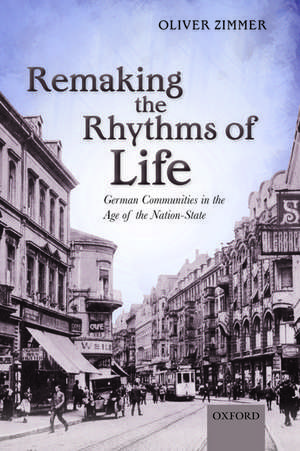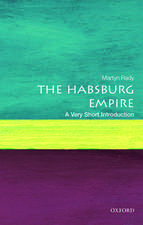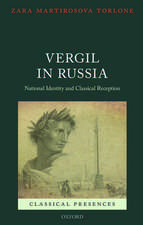Remaking the Rhythms of Life: German Communities in the Age of the Nation-State
Autor Oliver Zimmeren Limba Engleză Paperback – 25 noi 2015
| Toate formatele și edițiile | Preț | Express |
|---|---|---|
| Paperback (1) | 223.52 lei 31-37 zile | |
| OUP OXFORD – 25 noi 2015 | 223.52 lei 31-37 zile | |
| Hardback (1) | 484.82 lei 31-37 zile | |
| OUP OXFORD – 28 feb 2013 | 484.82 lei 31-37 zile |
Preț: 223.52 lei
Preț vechi: 269.26 lei
-17% Nou
Puncte Express: 335
Preț estimativ în valută:
42.77€ • 44.66$ • 35.40£
42.77€ • 44.66$ • 35.40£
Carte tipărită la comandă
Livrare economică 25-31 martie
Preluare comenzi: 021 569.72.76
Specificații
ISBN-13: 9780198766797
ISBN-10: 0198766793
Pagini: 410
Ilustrații: 16 black and white images
Dimensiuni: 157 x 232 x 23 mm
Greutate: 0.62 kg
Editura: OUP OXFORD
Colecția OUP Oxford
Locul publicării:Oxford, United Kingdom
ISBN-10: 0198766793
Pagini: 410
Ilustrații: 16 black and white images
Dimensiuni: 157 x 232 x 23 mm
Greutate: 0.62 kg
Editura: OUP OXFORD
Colecția OUP Oxford
Locul publicării:Oxford, United Kingdom
Recenzii
In his imaginative, rich, and thought-provoking study, Oliver Zimmer turns his three cities' supposed weaknesses into methodological strengths. He argues that it is exactly their in-betweenness - neither big cities nor hometowns, neither fully advanced nor wholly backward - that makes Augsburg, Ludwigshafen, and Ulm representative of urban life and culture in late-nineteenth-century Germany. Considering the fact that in 1914 about 40 percent of the German population lived in such middle-sized cities, historians should take this argument very seriously. [A] highly thought-provoking addition to the rich literature on Imperial Germany.
[Zimmer] makes some fascinating and novel connections... These towns, though subject to similar modernizing industrial trends, did not automatically become more alike. The work richly places both local history and modernity into each other's contexts: modernization is still acknowledged, but the importance of understanding local conditions is made especially clear as well.
Zimmer is best known as a historian of nationalism, and he acknowledges in the preface that this book began as an investigation into how nationalism was experienced by different religious communities in the Kaiserreich. While it has turned into something altogether more ambitious and wide ranging, it will still be of interest to scholars of nationalism as well as historians of nineteenth-century Germany and urban historians more generally. Mack Walker concluded his study by speculating about the connections between German home towns and National Socialism. For Zimmer, however, the master narratives of German history are less important than recapturing a sense of the creative energies people mobilized as they grappled with dislocation and change'.
This rich study, based on an innovative analysis of archival documents, presents an important new framework to explain the experience of dynamic economic, political, and social transformations and the ensuing tensions within the Kaiserreich. His attention to the coexistence of new visions and rhythms of life with concerns for stability, status, and localism is unique. ...Most important, Zimmers work invites scholars to join the dialogue about the Kaiserreich by raising new ways to address long-standing questions on the nature of the German state with his innovative terms and case studies. He makes clear German nationalism was far from linear or a tool of elite manipulation, and links the local and the national to yield important insights on social, political, and economic life.
his comparative urban histories are stimulating, especially in their approach to local, regional, and national problems, and their relations with each other.
Zimmer successfully demonstrates that the often overlooked characteristics of urban history clearly demonstrate the process of historical change and deserve the same type of careful study now accorded mainly to the great issues.
This is an ambitious, stimulating, and well-researched monograph that will reward the attention of historians of Germany and of Europe alike. Zimmer has added new layers to our understanding of late nineteenth-century German liberalism, its nationalist leanings, and its relations to German Catholicism. He also deserves praise for highlighting the real degree of urban agency (city life did not just reflect national or even regional trends) and the role that cities and towns played in the translation of policies (and intentions) to actual practice.
marks an important step on a promising path for new research on nineteenth-century urban history and modernity.
[Zimmer's] study is a comparative urban-cultural history exemplary not just for imperial Germany but for the study of other nation states as well ... Those interested in the development of culture, society, urban and national life in Germany and Europe in the nineteenth century will find this valuable reading.
[Zimmer] makes some fascinating and novel connections... These towns, though subject to similar modernizing industrial trends, did not automatically become more alike. The work richly places both local history and modernity into each other's contexts: modernization is still acknowledged, but the importance of understanding local conditions is made especially clear as well.
Zimmer is best known as a historian of nationalism, and he acknowledges in the preface that this book began as an investigation into how nationalism was experienced by different religious communities in the Kaiserreich. While it has turned into something altogether more ambitious and wide ranging, it will still be of interest to scholars of nationalism as well as historians of nineteenth-century Germany and urban historians more generally. Mack Walker concluded his study by speculating about the connections between German home towns and National Socialism. For Zimmer, however, the master narratives of German history are less important than recapturing a sense of the creative energies people mobilized as they grappled with dislocation and change'.
This rich study, based on an innovative analysis of archival documents, presents an important new framework to explain the experience of dynamic economic, political, and social transformations and the ensuing tensions within the Kaiserreich. His attention to the coexistence of new visions and rhythms of life with concerns for stability, status, and localism is unique. ...Most important, Zimmers work invites scholars to join the dialogue about the Kaiserreich by raising new ways to address long-standing questions on the nature of the German state with his innovative terms and case studies. He makes clear German nationalism was far from linear or a tool of elite manipulation, and links the local and the national to yield important insights on social, political, and economic life.
his comparative urban histories are stimulating, especially in their approach to local, regional, and national problems, and their relations with each other.
Zimmer successfully demonstrates that the often overlooked characteristics of urban history clearly demonstrate the process of historical change and deserve the same type of careful study now accorded mainly to the great issues.
This is an ambitious, stimulating, and well-researched monograph that will reward the attention of historians of Germany and of Europe alike. Zimmer has added new layers to our understanding of late nineteenth-century German liberalism, its nationalist leanings, and its relations to German Catholicism. He also deserves praise for highlighting the real degree of urban agency (city life did not just reflect national or even regional trends) and the role that cities and towns played in the translation of policies (and intentions) to actual practice.
marks an important step on a promising path for new research on nineteenth-century urban history and modernity.
[Zimmer's] study is a comparative urban-cultural history exemplary not just for imperial Germany but for the study of other nation states as well ... Those interested in the development of culture, society, urban and national life in Germany and Europe in the nineteenth century will find this valuable reading.
Notă biografică
Oliver Zimmer is Professor of Modern History at the University of Oxford and Sanderson Fellow at University College.
















